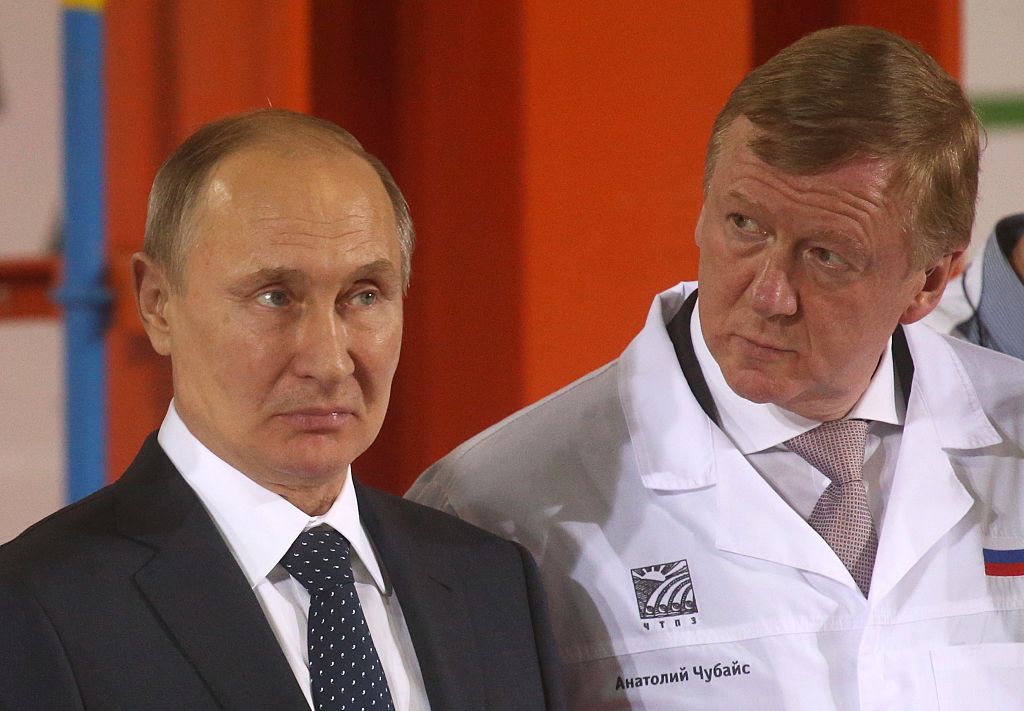Russian climate envoy reportedly quits, would be 'highest-level official' to split with Kremlin over Ukraine war


A free daily email with the biggest news stories of the day – and the best features from TheWeek.com
You are now subscribed
Your newsletter sign-up was successful
Russian climate envoy Anatoly Chubais has resigned from his post at the Kremlin and left the country out of opposition to Russian President Vladimir Putin's attack on Ukraine, Bloomberg reports Wednesday, per people familiar with the situation.
According to The New York Times, Russian state news agency TASS has reported that Chubais only stepped down from his role, not left the country. But per The Moscow Times, sources close to him have told the media that the now-former official is in Turkey.
If confirmed, Chubais, 66, would be "the highest-level official to break with the Kremlin over the invasion," Bloomberg writes. He is "is one of the few 1990s-era economic reformers who'd remained in Putin's government and had maintained close ties with Western officials." He actually even gave Putin his first job at the Kremlin, per Bloomberg.
The Week
Escape your echo chamber. Get the facts behind the news, plus analysis from multiple perspectives.

Sign up for The Week's Free Newsletters
From our morning news briefing to a weekly Good News Newsletter, get the best of The Week delivered directly to your inbox.
From our morning news briefing to a weekly Good News Newsletter, get the best of The Week delivered directly to your inbox.
Last week, Arkady Dvorkovich — senior economic adviser to former Russian President Dmitry Medvedev and a deputy prime minister until 2018 — resigned as head of state-backed Skolkovo technology in protest of the invasion. Dvorkovich "is one of only a few former senior officials to speak out against the war," Bloomberg notes.
A free daily email with the biggest news stories of the day – and the best features from TheWeek.com
Brigid Kennedy worked at The Week from 2021 to 2023 as a staff writer, junior editor and then story editor, with an interest in U.S. politics, the economy and the music industry.
-
 Political cartoons for February 20
Political cartoons for February 20Cartoons Friday’s political cartoons include just the ice, winter games, and more
-
 Sepsis ‘breakthrough’: the world’s first targeted treatment?
Sepsis ‘breakthrough’: the world’s first targeted treatment?The Explainer New drug could reverse effects of sepsis, rather than trying to treat infection with antibiotics
-
 James Van Der Beek obituary: fresh-faced Dawson’s Creek star
James Van Der Beek obituary: fresh-faced Dawson’s Creek starIn The Spotlight Van Der Beek fronted one of the most successful teen dramas of the 90s – but his Dawson fame proved a double-edged sword
-
 What is ‘Arctic Sentry’ and will it deter Russia and China?
What is ‘Arctic Sentry’ and will it deter Russia and China?Today’s Big Question Nato considers joint operation and intelligence sharing in Arctic region, in face of Trump’s threats to seize Greenland for ‘protection’
-
 What would a UK deployment to Ukraine look like?
What would a UK deployment to Ukraine look like?Today's Big Question Security agreement commits British and French forces in event of ceasefire
-
 Did Trump just end the US-Europe alliance?
Did Trump just end the US-Europe alliance?Today's Big Question New US national security policy drops ‘grenade’ on Europe and should serve as ‘the mother of all wake-up calls’
-
 Is conscription the answer to Europe’s security woes?
Is conscription the answer to Europe’s security woes?Today's Big Question How best to boost troop numbers to deal with Russian threat is ‘prompting fierce and soul-searching debates’
-
 Trump peace deal: an offer Zelenskyy can’t refuse?
Trump peace deal: an offer Zelenskyy can’t refuse?Today’s Big Question ‘Unpalatable’ US plan may strengthen embattled Ukrainian president at home
-
 Vladimir Putin’s ‘nuclear tsunami’ missile
Vladimir Putin’s ‘nuclear tsunami’ missileThe Explainer Russian president has boasted that there is no way to intercept the new weapon
-
 The Baltic ‘bog belt’ plan to protect Europe from Russia
The Baltic ‘bog belt’ plan to protect Europe from RussiaUnder the Radar Reviving lost wetland on Nato’s eastern flank would fuse ‘two European priorities that increasingly compete for attention and funding: defence and climate’
-
 How should Nato respond to Putin’s incursions?
How should Nato respond to Putin’s incursions?Today’s big question Russia has breached Nato airspace regularly this month, and nations are primed to respond
